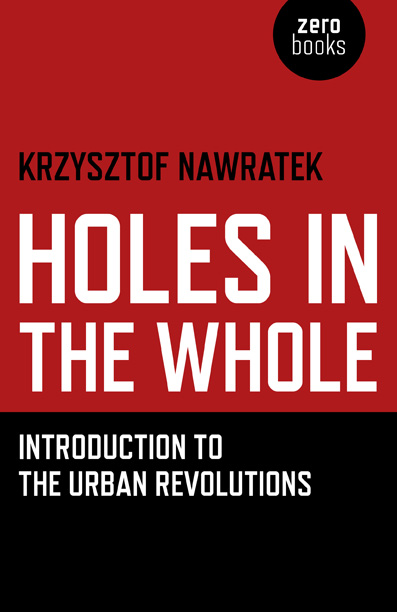Holes In The Whole
This book seeks meaning and reasons for the existence of the city. It demonstrates the urgent need to define the city not as a territory of exploitation and resource for global corporations but as a self-governed subject.

This book seeks meaning and reasons for the existence of the city. It demonstrates the urgent need to define the city not as a territory of exploitation and resource for global corporations but as a self-governed subject.
This book seeks meaning and reasons for the existence of the city. It demonstrates the urgent need to define the city not as a territory of exploitation and resource for global corporations but as a self-governed subject.
History & theory, Urban
Holes in The Whole seeks meaning and reasons for the existence of the city. It demonstrates the urgent need to expand the sphere of urban activity - to define the city not only as a territory of exploitation, but as space of human existence in its fullest dimension. The book defines the conditions under which the city can develop as an entity without falling into the trap of arrogant self-sufficiency. It identifies the mechanisms that promote independent fragments, including people, neighbourhoods and regions, so that they are not random, unsystematic bunches, but stable (yet flexible) structures.
Click on the circles below to see more reviews
Holes in the Whole is a welcome contribution to an increasingly crowded field of writing on cities. The book is a short but always a stimulating read, provoking questions and offering flashes of insight. Fighting against city-making that is too often captured by the “totalitarian logic of profit” and the focus on constructing urban political institutions that respond to a wider range of inhabitants’ demands is important in making us think of urban dwellers as true ‘citizens’ of their cities. ~ Karl Baker, LSE http://blogs.lse.ac.uk/lsereviewofbooks/2013/05/15/book-review-holes-in-the-whole-introduction-to-the-urban-revolutions/
Packed with fascinating and provocative insights ~ Anna Minton, author of 'Ground Control. Fear and happiness in the twenty-first-century city'
A refreshing book. In a context where only "world cities" matter to most urbanists, Krzysztof Nawratek is a thinker equally at home writing about Katowice and Shanghai, London and Plymouth. In this unromantic, lapidary but ultimately optimistic work he offers a precise diagnosis of contemporary urban ills and offers some potential ways out of some worn-out ways of thinking the city. Never mind worrying about the Polis or the decline of public space - this book calls instead for a revolutionary new urbanism. ~ Owen Hatherley, , author of 'Militant Modernism', ' A Guide to New Ruins of Great Britain' and 'A New Kind of Bleak: Journeys Through Urban Britain.'
This is an engaging book – written in the first-person, and crossing genres of criticism, confession, analysis and polemic. It provokes the reader to think about urbanism as a dynamic intellectual field of ideas and experiences. Specialists and general readers will find this book stimulating as the author leaps around from idea to idea, always provocative and always full of insights. He relates issues in architecture, the city and urban life to a range of historical philosophical and cultural issues – from justice and ethics to creativity and community, public space and violence. There are few writers who take such a synthetic and wide-ranging approach in the English speaking world. Moreover, it intellectually reconnects Europe’s East and West, introducing a sense of flair into an overly laboured field of academic research. ~ Dr. Jonathan Vickery, University of Warwick